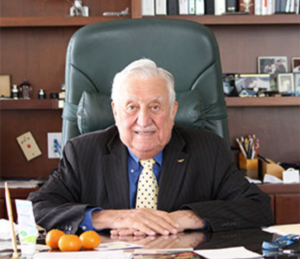 Interview by Shirley Polumbo
Interview by Shirley Polumbo
On August 17, 1985, Chief Judge Emeritus A. Jay Cristol was appointed judge to the United States Bankruptcy Court for the Southern District of Florida (District). His wise disposition, prudent remarks, hilarious insights, and witty comments have made Judge Cristol a favorite of the Bankruptcy Bar in the Southern District. Certainly, his charm must transcend to other jurists, scholars and colleagues nationally as well. His astute professional reasoning is bolstered by a candid and exceptional concern of others. His altruism is reflected in society through his formidable advocacy of bankruptcy protection and the policy of the “fresh start” , demonstrated by his constant kind gestures to those around him, shown by his donation to the bankruptcy clinic at the University of Miami School of Law, and evidenced by the law school naming the clinic in honor of him and his late wife. The clinic was named The Eleanor R. Cristol and Judge A. Jay Cristol Bankruptcy Pro Bono Assistance Clinic.
After he graduated from the University of Miami in 1959, he went to work as a Special Assistant Attorney General of Florida. He was appointed as a trustee from 1977 to 1985. He later served as the District’s Chief Bankruptcy Judge from 1993 to 1999. But that is only part of Judge Cristol’s accomplishments. He also served as an aviator in the U.S. Navy in the Korean War and as a captain in the U.S. Naval Reserve with 38 years of service in the diverse roles of both a carrier pilot and a Judge Advocate General Corps (JAG) lawyer. To top it off, he earned a Ph.D. from the Graduate School of International Studies at the University of Miami on May 9, 1997.
His kind gestures are seen daily by those around him and have always been his modus operandi. I remember, probably around 1997-98, when the Chapter 13 confirmation hearing calendar would go on until 7 p.m. Cases would settle in the hallway; new contested issues would come up and the judges would listen to the parties until the last case on the docket was heard. As the volume of bankruptcy filings grew, the docket, per judge, finally was split into various days in the month. This ultimately allowed the judges and attorneys to leave the courtroom at an “appropriate” time.
I recall it being very dark outside one evening in the Fall during one of those 7 p.m. confirmation hearing calendar . Judge Cristol made sure I made it to the parking lot safe and sound before walking away. I learned he did this with others as well. Three decades later his actions, dedication to others, and professional ethics remain the same. He is popular and beloved. His opinions and personality have influenced generations of lawyers and current Justices.
As he prepares to retire, Judge Cristol is keeping himself busy in the courtroom, teaching at Miami Law, and participating in various charity events. We caught up with Judge Cristol through Cheryl Kaplan, his ever-constant law clerk and attaché . This short, written interview retraces Judge Cristol’s path from a schoolboy to a leading bankruptcy judge. We hope his experiences and contributions while on the bench will assist and inspire us as advocates and those who wish to follow in this or similar roles.
Judge Cristol provided his below-written responses to the interview questions presented to him.
- What did you do during your spare time when you were young? I was a boy scout and attained Eagle Scout status. I rode horses, played pinball, and volunteered as an aircraft spotter during WWII.
- What were your favorite subjects at school? My favorite subject was plane geometry.
- What can you tell us about your first job? I worked for the Attorney General of Florida during legislative sessions in the bill drafting department.
- What made you become a bankruptcy trustee? I was invited to join the panel of trustees.
- What skills have you seen in the courtroom that make for great lawyering? Preparedness and the ability to present arguments in a persuasive manner.
- What were some of your favorite moments while on the bench? Presiding over cases where I was able to help indigent people keep their home or car or both through the application of the Bankruptcy Code.
- What inspired the beautiful and clever poem opinion in In re Love, 61 B.R. 558 (1986)? While I was constrained to render my opinion based upon the law as written by Congress, I was inspired to use verse to highlight its absurdity. Congress passed a law (11 U.S.C. §707(b)) which authorized dismissal of bankruptcy cases for bad faith or abuse but the law did not provide a mechanism for any person or entity to bring the matter before the court.
- What advice would you like to give attorneys as we move forward? Your mantra should be “Do the Right Thing”
- Describe the characteristics of the attorneys that you most enjoyed as they argued a matter in front of you? Those attorneys who come fully prepared and are able to respond coherently to tough questions.
- Describe the characteristics of the leaders with whom you most enjoyed working. This can help improve or inform leadership strategies. Being fair and impartial, and deeply concerned about doing the right thing.
- The bankruptcy court is a court of equity. What do you think of the meaning of equity and how best to accomplish it? Equity focuses on impartiality, and striving to always do the right thing is the best way to accomplish that.[1] “There are aspects that are unique to the U.S., and that is the idea of having a fresh start or a second chance,” Cristol said. “Many economists believed that the success of the U.S. was that you could try to start a business here and fail and would not be executed. A fresh start or a second opportunity are major factors in the success of our economy.” See, Mora, M., South Florida Judge to Step Down From Federal Bench, Search to Begin for Successor, Daily Business Review, PROFILE Jan. 2, 2022 https://www.law.com/dailybusinessreview/2022/06/02/south-florida-judge-to-step-down-from-federal-bench-search-to-begin-for-successor/?slreturn=20220907082331

